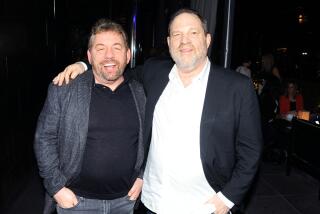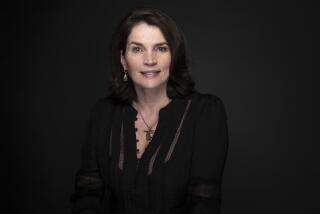Has anyone fallen faster than Harvey Weinstein?
One might say it’s among the most stunning falls from grace Hollywood has ever seen, but the word “grace” has rarely been used where Harvey Weinstein is concerned.
In less than a week, the mounting scandal over allegations of sexual harassment and assault has rapidly consumed the once-powerful film mogul — and the entertainment industry as a whole. With fresh accusations against Weinstein continuing to emerge after stories involving stars such as Gwyneth Paltrow and Angelina Jolie broke in the New York Times and the New Yorker, organizations and individuals across Hollywood and in politics are scrambling to distance themselves from him, while large and uncomfortable questions are arising about what the scandal reveals about the culture of Hollywood.
Since the first New York Times story appeared last Thursday, Weinstein — a man who for decades was renowned for his ability to mint award-winning hits like “Pulp Fiction,” “Shakespeare in Love” and “The King’s Speech” and whose films have racked up more than 300 Oscar nominations — has become a pariah.
The Weinstein Co., which he ran alongside his brother Bob, has fired him. His wife, fashion designer Georgina Chapman, with whom he has two children, has announced that she is leaving him. And the film academy, whose validation Weinstein so clearly cherished as a brash outsider from Queens — and whose 54-member board of governors currently has 21 women serving on it — has publicly disavowed him.
On Wednesday, the academy released a statement calling Weinstein’s alleged behavior “repugnant, abhorrent, and antithetical to the high standards of the Academy and the creative community it represents” and announced that its board of governors would hold a special meeting Saturday to review his membership.
Read The Times’ full coverage of the Harvey Weinstein sexual harassment scandal >>
For a figure whose Midas touch when it came to the Oscars has long been the stuff of legend, such a repudiation by the film industry’s preeminent organization, the Academy of Motion Picture Arts and Sciences, capped a collapse unlike anything Hollywood has seen in modern memory.
In this context, reports less than an hour later of a 911 call involving a distressed Weinstein seemed almost unsurprising.
As the accusations against Weinstein increased, Hollywood — which has long spoken of sexual harassment only in whispers, if at all — has been able to talk about little else.
“Everybody on set is talking about it — it’s unreal,” “Moonlight” director Barry Jenkins told The Times on Wednesday from the set of his next film, “If Beale Street Could Talk.” “I’m still wrapping my head around it. The persistence of his [actions] is astounding.”
“It’s shocking,” said director Jon M. Chu, who currently has an adaptation of the Broadway musical “In the Heights” in development at the Weinstein Co. “When things happen in the business, it feels like the end of the world, but you ask your friends outside and they’re like, ‘Who? What?’ This one, though, feels like it’s gone much more widespread. I didn’t know my mom really knew who Harvey Weinstein is — and suddenly she does. It’s all her fears of this industry come true.”
On the red carpet Tuesday night for the upcoming Marvel movie “Thor: Ragnarok,” actors who would normally be fielding softball questions about their favorite superheroes were suddenly being asked probing questions about sexual harassment. Meanwhile, a parade of stars who have worked with Weinstein, including Meryl Streep, George Clooney and Matt Damon, stepped forward to publicly condemn him and insist that they didn’t personally know about his mistreatment of women, despite that many have said it was an open secret.
“Not everybody knew,” Streep said in a statement. “And if everybody knew, I don’t believe that all the investigative reporters in the entertainment and the hard news media would have neglected for decades to write about it.”
Organizations and individuals with any connection to Weinstein have quickly moved to distance themselves. The USC School of Cinematic Arts said Tuesday that it was rejecting a $5-million pledge from Weinstein to fund an endowment for female filmmakers, while the British Academy of Film and Television Arts suspended Weinstein’s membership in the organization.
Amid the cascade of accusations , many have raised questions about how it could have been allowed to go on for so long — and where the next shoe might drop.
“It’s pretty hard to not just be constantly outraged,” said writer Jen Statsky, who has worked on the TV series “The Good Place” and “Broad City.” “You’re just constantly refreshing the news. We are all shocked at how truly horrific these stories are, but we also recognize that this is the culture we live in. This is how women are devalued.”
And while Hollywood is the focus, the scandal quickly metastasized into the broader media landscape and the political realm. Sharon Waxman, who runs the industry news site the Wrap, accused the New York Times of having scotched a story on Weinstein’s alleged sexual misconduct more than a decade ago — a charge the paper pushed back against strongly. Ronan Farrow, who published a harrowing account of Weinstein’s alleged treatment of 13 women in the New Yorker, claimed that NBC News had earlier passed on the story, raising questions of whether it had caved to pressure. NBC quickly denied this.
Weinstein was a longtime supporter of liberal causes and candidates, and the scandal quickly became politicized. In wake of previous attacks from the left on the likes of Roger Ailes, Bill O’Reilly and Donald Trump, conservatives lobbed charges of hypocrisy. This was quickly followed by many Democratic officials, including Sens. Elizabeth Warren of Massachusetts and Kamala Harris of California, donating the amount Weinstein had given them to charity while former President Obama and former presidential candidate Hillary Clinton stepped forward to publicly renounce him.
“Any man who demeans and degrades women in such fashion needs to be condemned and held accountable, regardless of wealth or status,” Obama said in a statement, while Clinton said such behavior “cannot be tolerated.”
While the spotlight thus far has been squarely on Weinstein, many believe the scandal will become a watershed event for Hollywood, sparking wider conversations about sexual harassment, much like the #OscarSoWhite controversy did for the issue of diversity.
Indeed, following the allegations about Weinstein, actor Ben Affleck — who released a statement saying he was “saddened and angry” by the reports — was confronted with accusations that he had groped actress Hilarie Burton years ago during an appearance on MTV’s “Total Request Live.” The actor quickly issued an apology, saying he had “acted inappropriately” toward Burton. Meanwhile, actor and former NFL player Terry Crews took to social media to recount an incident from last year in which he claimed he was groped by a high-ranking male film executive.
“I understand and empathize with those who have remained silent,” Crews wrote. “But Harvey Weinstein is not the only [alleged] perpetrator…. Hopefully, me coming forward with my story will deter a predator and encourage someone who feels hopeless.”
“What’s really important right now is that there’s an uprising — people are saying, ‘No, this is problematic,’” actress Blake Lively told The Times. “Women need to speak up, and women need to be heard. It’s not one industry, and it’s every level of the food chain. It’s just something women learn to write off as the day-to-day of being a woman: ‘She asked for it because she wore a dress.’ But thank God now the conversation is shifting.”
Twitter: @joshrottenberg
ALSO
The legal fallout from the mushrooming Weinstein sex scandal could be big
With shock and anger, Hollywood responds to the Harvey Weinstein sexual misconduct scandal
Hillary Clinton says she was ‘appalled’ at Weinstein news, will give away his donations
More to Read
Only good movies
Get the Indie Focus newsletter, Mark Olsen's weekly guide to the world of cinema.
You may occasionally receive promotional content from the Los Angeles Times.











